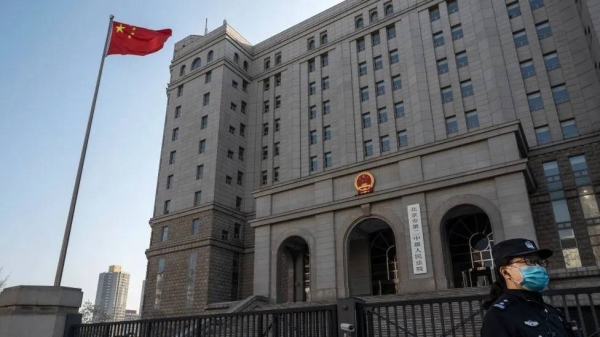
A far-right German politician has said he will continue to run for the upcoming European parliamentary elections despite allegations that his adviser was spying for the Chinese government.
Maximilian Krah, who is the lead contender for the Alternative für Deutschland (AfD) party, told journalists in Berlin: “I am and will remain the main candidate” after an emergency meeting with party bosses on Wednesday morning after the allegations came to light.
Krah, a jurist and Catholic, said he regretted that the affair would “overshadow terribly” the June election but said he would refuse to “wear sackcloth and ashes” on behalf of someone else, insisting he had had no knowledge of the affair.
Prosecutors said that Jian Guo, a Chinese-German adviser accused of having passed on details of European parliamentary business to the Chinese secret service, had been brought before an investigating judge and put into pre-trial detention in the early hours of Wednesday. He had been arrested at his home in Dresden on Tuesday on suspicion of spying in what prosecutors called “an especially serious case of espionage”.
Even as the AfD party bosses, Alice Weidel and Tino Chrupulla, appeared to seek to distance themselves from Krah – who has long had a reputation as a troublemaker in the party, insisting on wanting to “playing the baddy” and once saying: “Who wants to play Luke Skywalker if he can be Darth Vader?” – they said he would remain their lead candidate.
Krah said he knew nothing about the activities of Guo, or about the suspicions surrounding him that have circulated in Berlin, Washington, and Brussels since last year.
“I am extremely interested in an explanation and will make an effort to find out myself what the concrete accusations are,” he told journalists outside Berlin’s parliament building on Wednesday morning, where he was surrounded by reporters.
Weidel and Chrupulla said that, while they were sticking with Krah, his profile would be kept low at upcoming party rallies in the run-up to the European parliamentary election. Campaign posters bearing his face and details of his candidature would also be withheld, party bosses said, in what seemed to be an attempt at damage limitation.
After a face-to-face consultation with Krah, which they had said been “to discuss the serious allegations of espionage against his employee and the associated damage to his reputation”, the party leaders said in a statement that Krah had agreed to terminate Guo’s employment with immediate effect.
They said the decision to pull Krah from the start of the AfD’s upcoming election campaign in south-west Germany was “in order not to put a strain” on either the “campaign or the party’s reputation”.
Appearing to condemn Guo’s alleged activities, it concluded: “Any influence by foreign states through espionage, but also attempts to buy opinions and positions, must be investigated and strictly prohibited.”
Despite his insistence he was not aware of Guo’s alleged activities, Krah’s enthusiasm for the Chinese government had been raising eyebrows in Brussels and beyond for some time.
In 2019 he voted against a European parliamentary resolution in which Beijing was ordered to stop suppressing the rights of the Uyghur people, calling criticism of China’s human rights record “anti-Chinese propaganda”.
He has also congratulated the People’s Republic of China on the anniversary of its founding, and insisted that Taiwan belongs to Beijing under international law and that Tibet is its rightful territory.
On 8 December last year, on travelling to New York for a gala, Krah was pulled out of a group of arrivals and questioned by the FBI on his apparent close links to China, as he himself has since acknowledged.
Misgivings were said to have surrounded Krah’s candidacy for the European parliamentary elections from the start, but nevertheless he was voted into the post by 65.7% of the party.
The Guo affair is the latest in a string of headline news focused on the AfD in the past weeks, amid growing speculation and debate over its suspected foreign influences.
Krah’s number two in the European parliamentary elections, Petr Bystron, stands accused by Czech investigators of having taken at least €20,000 from a pro-Russia network.
In some EU countries, including Ireland, and the UK when it was a member of the bloc, politicians stand in constituencies. But in most countries in the EU, parties have national lists with voters asked to vote for a party rather than an individual, giving the candidates at the top of the list high odds of being elected.
A judge and former AfD MP, Birgit Malsack-Winkemann, is soon to appear in court as one of the suspects in a far-right plot to overthrow the Bundestag, which came to light in December 2022.
The AfD is one of 28 far-right parties standing in the upcoming European parliamentary elections. Publicity surrounding attempts to influence several of them from outside has been swirling in recent months.
The AfD has come under particular scrutiny since revelations over its participation last year in a neo-Nazi meeting about the mass deportation of immigrants, asylum seekers and German citizens of foreign origin deemed to have failed to integrate.












